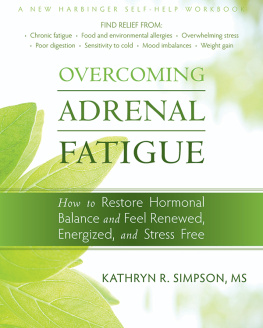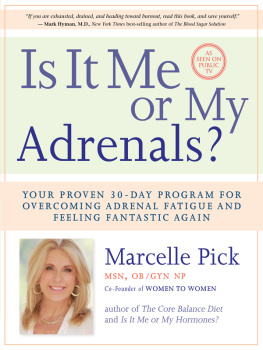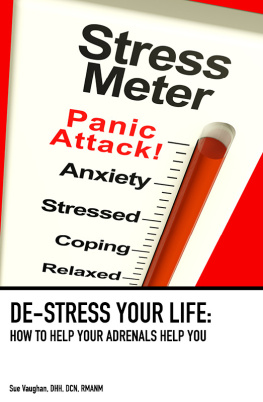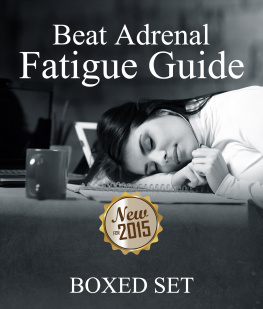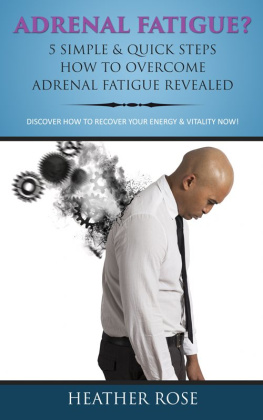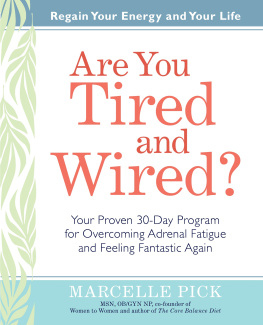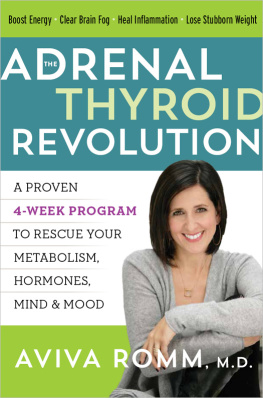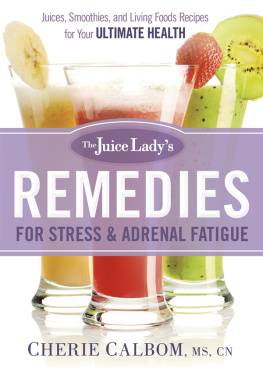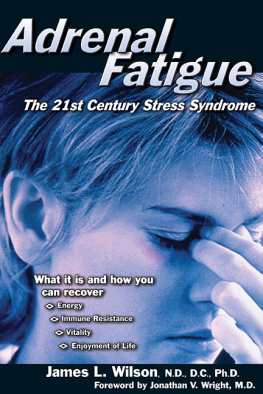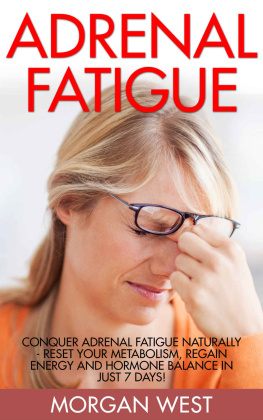Simpson received a bachelors degree from Ohio Wesleyan University and a masters of science degree from the University of Southern California. She founded a specialty hormone clinic to treat hormone imbalance and diseases such as multiple sclerosis, lupus, and fibromyalgia. Today, it is dedicated to ongoing endocrine research and education. Simpson is CEO of Cerulean Pharmaceutical, which researches and develops therapies for the treatment of endocrine-related disorders. She is author of The Womens Guide to Thyroid Health, and lives in Los Olivos, CA, with her husband, Robert, and three sons, Tyler, Kyle, and Myles.
Chapter 1. The Miraculous Adrenal Glands
Your adrenal glands are vital to your health and well-being. They help you survive stress by producing hormones that keep your body on an even keel despite the fact that youre constantly being buffeted by stressors you cant control. They help maintain homeostasis, bringing equilibrium to your energy level, your weight and body shape, your mind, your emotions, and just about every physiological system in your body.
When I use the word stress, Im not talking about just a bad day. Im talking about the cumulative effects of a wide variety of situations: problems at work, at home, or within the family; worry, frustration, and inability to cope; and everything from long-term financial pressures or rush hour traffic to physical stressors like injury, infection, illness, inadequate diet, environmental toxins, or lack of sleep or exercise. Stress can be any external force that puts pressure on your mind or your body, and it can even include positive events, like marriage, a promotion, the birth of a baby, or moving to a new neighborhood or town.
The adrenals respond to any form of stress with a programmed biochemical response: the adrenaline. This makes you extraordinarily alert. Heart rate, breathing rate, blood pressure, and metabolism all speed up to increase the flow of oxygen and deliver it to muscles. Pupils dilate to sharpen vision. The liver releases stored blood sugar to increase energy. Sweat is produced to cool the body. The immune system goes on red alert, pumping out proinflammatory substances to attack invading bacteria and viruses and heal wounds and moving immune cells into their fighting positions.
Activities that arent important to survival are immediately curtailed, such as blood flow to nonessential areas, including the hands, feet, scalp, and intestines. Blood vessels in the skin are also constricted, to lessen bleeding in case of injury, and blood clotting is increased to further control blood loss. Digestion is slowed so that the body can redirect its resources to deal with the stressor. And finally, natural painkillers are released to prevent the pain that could slow you down if youre injured.
Modern Stress
Historically, the stress response was geared to handling short-term eventscrises that came and went quickly. Its purpose was to prepare us for a fight with a neighboring tribe or a quick dash to safety. Weve all read stories about a parent being able to lift a car off a child. This short-lived superhuman strength is fueled by adrenaline. It helped our ancestors survive encounters with ferocious beasts or hostile fellow humans. Those who survived such encounters often had time to recover from the exertion or any wounds sustained, allowing the adrenals to rest and recuperate.
Today our stressors are differenttheyre as often psychological as they are physical, and they dont seem to let up. We all know what modern stress feels like; were inundated with it on any given day: Rushing to get the kids ready for school, you cut your hand while slicing a bagel. You wrap it in gauze and head out the door. You drop the kids at school and head to work, catching up on calls while en route. Once there, you face nonstop meetings, calls, and presentations, and lunch is an energy bar and a diet cola. You navigate bumper-to-bumper traffic as you go to pick the kids up from after-school activities and stop for groceries on the way home. You walk in the door, make dinner, supervise homework, put the kids to bed, respond to e-mails, and then edit a spreadsheet for your client meeting first thing in the morning. Youre lucky if youre in bed by midnight. Whew!
Unfortunately, the bodys response to this new kind of stress is the same as it was when our ancestors were fighting for their lives. Your body wants to survive the perceived threat, so it bypasses your brain to respond with the biological stress response.
Persistent stress causes your adrenal glands to constantly produce an excess of the stress hormones cortisol and adrenaline. Chronic exposure to these hormones suppresses healing and growth and can eventually cause problems with the many functions that are affected by the stress response, including digestion, energy, immunity, cognition, emotions, and metabolism.
Coping with Modern Stress
The modern stress situation isnt all gloom and doom, though: some mental stress can be a good thing. It can motivate us to productive action. It can excite us and enhance our sensory awareness and mental acuity. And if you understand how your body responds to stress, you can begin to control your physical reaction to it. One way to impact your bodys response to stress to is make changes to your diet and lifestyle. The amount of sleep and exercise you get plays a part in your ability to handle stress, as does your use of substances like nicotine, drugs, and alcohol. In addition, your mental attitude can temper your physical reaction to stress.
will discuss these factors in detail, but because your outlook can have such a profound impact on your stress response, its worth spending a bit of time on this topic at the outset. In short, your physical reaction to stress is partially based on your interpretation of whether something is dangerous or not. This plays a large role in determining whether you will respond calmly or in full-on fight-or-flight modecomplete with hyperventilating and heart palpitations. Heres an example of the role perceptions play: Almost all of us initially react to public speaking with a full-blown stress response and high levels of adrenaline and cortisol. But after speaking a number of times, we realize it wont hurt us, and most of us dont perceive it as a threat anymore. A study showed that, after some experience with public speaking, 90 percent of people can handle it without elevated levels of stress hormones, but about 10 percent continue to find it incredibly stressful; their bodies respond every time as if a predator were chasing them (Kirschbaum et al. 1995).

